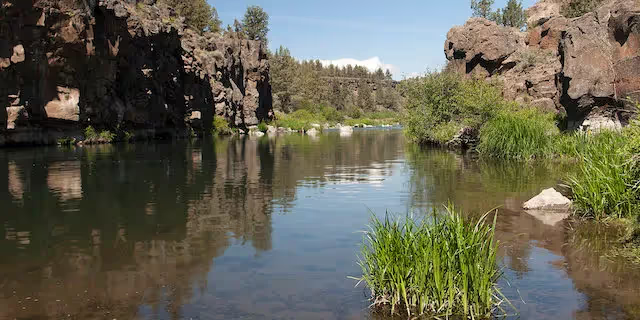Capital Press: Oregon water regulators fund Deschutes water bank study

By Mateusz Perkowski
Oregon water regulators overrode the recommendation of a grant review team to award $330,000 to study a “water bank” pilot program in the Deschutes basin.
The Deschutes River Conservancy nonprofit sought the funding to examine the feasibility of a clearinghouse for water transactions in the region, easing the ability of irrigators and others to lease water.
The “water bank” would let some irrigators “deposit” unused water supplies into the clearinghouse, which could then be leased by others, with the transactions consolidated for speedier regulatory approval by the Oregon Water Resources Department.
Trending Simplot changes company name, structure Idaho butcher accused of cattle theft sentenced to probation The Deschutes Water Conservancy, which is spearheading the project, intends to spend about $660,000 evaluating the practical considerations of creating the water bank and sought to obtain half that amount from the OWRD’s feasibility grant program.
However, the application review team that makes funding recommendations advised the Oregon Water Resources Commission, which oversees the OWRD, against approving the grant because it doesn’t fit the program parameters.
Specifically, the review team determined the funding would be used more for implementation of the water bank rather than studying its practicality, as the tasks outlined in the proposal “suggested that the project has already been determined to be feasible.”
The recommended denial was challenged by several lawmakers and the Deschutes River Conservancy, which argued the steps proposed in the application actually do meet the requirements of a feasibility grant.
“Significant program design questions remain,” said Kate Fitzpatrick, the nonprofit’s executive director, during a Sept. 11 commission meeting at which the grant funding was discussed.
For example, the nonprofit still needs to evaluate the most appropriate governance system for the water bank, the pricing mechanism for transactions and the volume of water that’s likely to be involved in the pilot program, she said.
The proposal is not unlike another application for feasibility grant funding, in which the applicant is likely to proceed with a canal piping project but still needs to decide important details about implementation, Fitzpatrick said.
“The ideas need to be tested so we can eventually scale up and really make a difference,” she said.
Lawmakers have aimed to create a “pipeline” of various grant sources that shepherd water proposals from feasibility studies to actual development, but it’s unlikely the “water bank” would fit under the parameters of an implementation grant, either, she said.
If the project isn’t eligible for a feasibility grant, that would indicate a significant “gap” exists in the state’s funding pipeline for water proposals, she said.
“We’re not at implementation, so I don’t know what else we would call it,” Fitzpatrick told the commission.
Earlier this year, lawmakers approved House Bill 3806, which authorizes legal revisions enabling the “water bank” pilot program, but this legislation did not include any funding, she said.
“We did not want it to get caught up in Ways and Means,” Fitzpatrick said, referring to the budget-setting committee where bills often die due to budget constraints.
If the grant funding was denied, the nonprofit would have to try to find another source of money, which “whittles down the time” to examine the pilot program’s performance, she said.
After discussing the matter, the commission ultimately voted unanimously to approve the $330,000 grant, with several members stressing they respect the review team’s consideration and recommendation against funding.
“This is not a reflection on that. We just felt this was the right thing to do,” said Julie Smitherman, a commission member and a municipal water resources coordinator.
Janet Neuman, a commission member and retired water law attorney, said she cast a “reluctant yes” to approve the funding, given her unwillingness to delay the pilot program.
“I don’t feel this is the right way to do it, but we have been put in a box,” Neuman said.
Apart from the “water bank” proposal, four other applications were approved by the commission for a total of more than $1 million of the $1.5 million available for grants.
Three of those proposals pertain to aquifer recharge, which typically involves replenishing groundwater supplies with abundant winter stream flows, by the cities of Corbett and Molalla, as well as a broader study of basins in Southern Oregon.
The remaining project focuses on studying the replacement of an open canal with a pipeline by an irrigation district in Linn County.
Read more at: https://capitalpress.com/2025/09/12/oregon-water-regulators-fund-deschutes-water-bank-study/
Photo: The Deschutes River. Oregon water regulators overrode the recommendation of a grant review team to award $330,000 to study a “water bank” pilot program in the Deschutes basin. (Courtesy Oregon Department of Fish and Wildlife)

